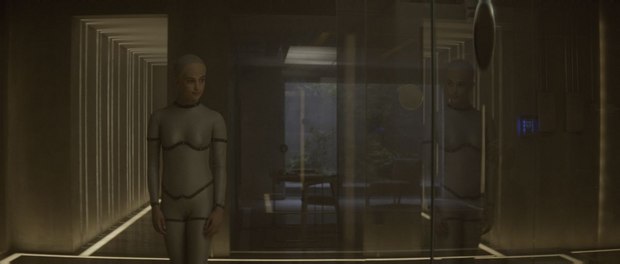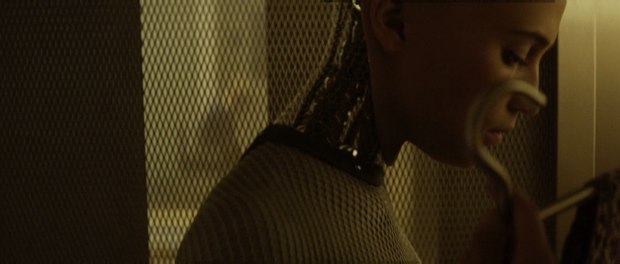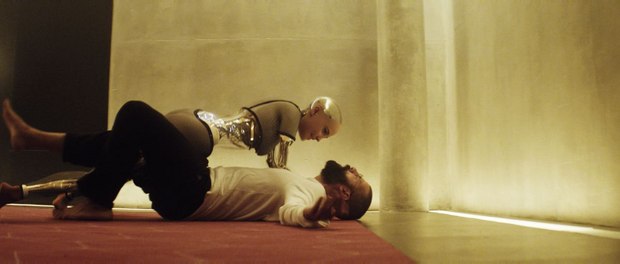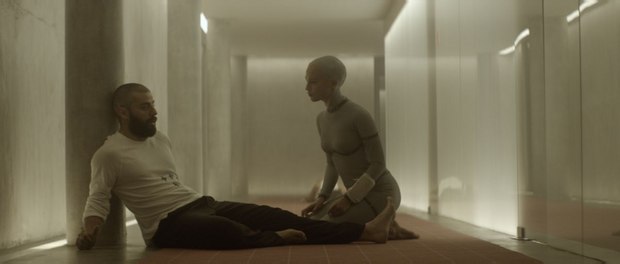Overall VFX supervisor dishes on his stunning Academy Award win for best achievement in visual effects on Alex Garland’s sci-fi thriller.
With a reported $15 million overall budget, Alex Garland’s Ex Machina might be the “smallest” film to ever win an Academy Award for best achievement in visual effects. But in the eyes of the Academy voters, the film’s “small” visual effects made a big impact, earning the film a surprise Oscar against stiff competition that included The Martian, The Revenant, Mad Max: Fury Road and the overwhelming favorite, Star Wars: The Force Awakens.
For Ex Machina’s overall VFX supervisor, Andrew Whitehurst, the stunning win was completely unexpected. In a conversation last week, he talked about the challenges faced working with such a small budget and how he and his team made the most of a six-week shoot, capturing as much in-camera as possible to keep the need for CG replacements, and their high cost, to a minimum…and how he was completely taken by surprise when Oscar came calling.
Dan Sarto: First of all, congratulations. It's really a surprise, stunning, but well deserved win, so congratulations to you and your team.
Andrew Whitehurst: Thank you very much. I think we were the four most surprised people honestly. I don't think any of us dreamt that this was how things would turn out. It just seemed so unlikely.
DS: I think it's safe to say you guys were kind of a dark horse candidate, even for consideration at the VFX Bake-off, let alone getting a nomination and eventually winning the Oscar.
AW: That's absolutely true. The thing I found most interesting is for Ex Machina, the long scenes, the long shots, the whole emotional impact of the reel [at the Bake-off] came from the way that the sequences were put together. Particularly at the Bake-off, when they share a reel of the year’s visual effects work, they [the Academy] didn’t really know how to cut in shots from Ex Machina because there aren't any big explosions or something ultra-dramatic that happens that works in a fast cut show reel. It's all sort of very long, lingering shots, that on their own, are beautiful. But their real power comes from when you actually have them running together as a sequence.
Certainly, when I was putting the reel together for the Bake-off, it was very apparent to me, sitting with the editors looking at the shots, that all we needed to do was let these sequences play out -- just pick some of the best sequences to get us to the ten-minute time limit for the reel. That's what we should do. We shouldn't try to do any extra clever editing, any of that kind of stuff, because it doesn't help the work. It's unusual for visual effects being used in that kind of way. I know from most of the other films I've worked on that generally the visual effects are going to be used towards spectacle.
In Ex Machina, the visual effects are much more delicate than that. I guess we are unusual in that regard, but I actually thought that this year's short list, particularly the five nominees, was such an interesting range of films. Its only really Star Wars that you would say was sort of the obvious kind of visual effects-type movie. The work is beautifully done and there's lots of it. Everything else is slightly off kilter to one degree or another.
The Revenant is an existential Western, you've got Mad Max as a sort of feminist pop art road movie, you've got us. Even The Martian is not super spectacle-heavy science fiction, it's more the cerebral heavy-on-the-science science fiction. It was a really interesting year for the nominations. I was slightly surprised when we made the long list. I was really surprised when we made the short list. I was gobsmacked when we got a nomination and I still don't quite believe that we've won the Oscar.
DS: Do you think the nature of the film itself, a psychological thriller without potentially distracting explosions or other “big” visual effects going on, with a unique and richly visual, almost hypnotic narrative, ultimately played to your advantage?
AW: It's really hard to know whether that makes a difference with the way the reels are put together. I don't know how most of the voters think. I would be surprised if most of the people in that room hadn't 80% made up their minds regarding who they were going to vote for before even coming out to the Bake-off. Maybe the only film they might not have considered was The Revenant because it was so new at the cinema -- they might not have seen it yet.
Our reel, because of the way it was put together, to me felt good as a piece on its own, less obviously “show reel-ly.” I actually sit next to Andrew Jackson, the Mad Max supervisor, in our London office [Double Negative’s London studio], and I know that he was finding it very difficult to cut the reel together because the shots in Mad Max are incredibly short at eighteen frames each. He spent a lot longer putting that reel together than we did with the Ex Machina reel. At the Bake-off, the way our reel was structured, I don't think it hurt us at all. But clearly my ability to read the room was not very good because I didn't think we were going to get a nomination, let alone win.
I definitely felt more buzz and reaction from the crowd to the sort of bigger scale stuff, like Avengers: Age of Ultron. [During their reel] There seemed to be more agitation in the crowd whereas for ours, it seemed quieter. Maybe that's just because people were concentrating on it. I can't honestly say that that was a deciding factor. I could be wrong, but I think people really pre-made up their minds.
DS: Do you think that your win might signify a bit of change within the industry, for studios to start thinking of visual effects with more regards to story continuity as opposed to mostly wow factor and visual spectacle?
AW: I definitely think that's happening now. Again, just look at the nominees. The Revenant…I guess there’s a lot of spectacle in it, but a lot of that spectacle is just mother nature being mother nature. It's not what you would call a summer Blockbuster-type movie. Mad Max isn’t either because it is so hyper-stylized and hyper-kinetic. Even that doesn't really fit the kind of tentpole summer release mold.
Yes, certainly, smaller budget films are increasingly using visual effects because visual effects are becoming more affordable. Also, you have a generation of filmmakers now who are comfortable with visual effects, that don’t think of visual effects as just this weird bunch of nerds that are called on in post-production to do stuff that no one quite understands. You have a definite sense now of visual effects just being one of the departments that's on the film – it’s one of those departments that if you have a director that wants to collaborate, is one of the collaborators. That shift is one of the things that excites me most about working in visual effects right now. Long may that continue.
DS: In your comments backstage at the Oscars, you mentioned that even though you worked with a constrained budget, because your film was so different from the other nominees, you didn't necessarily feel you were at a disadvantage - it was a different type of film that required a different type of visual effects and that was your focus. Still, you guys did so much with so little. That has to impact your work to some degree.
AW: Yes, it does affect your ability to work. But what it also does is concentrate minds everywhere on the production. If you are lucky enough to have a director like Alex Garland, you can sit down with him and say, "Look, I know we were talking about things looking like this, but that's going to be very time consuming, and too expensive, for this reason, this reason and this reason. Why don't we try doing this? What do you think?" He will think about it and say, “Yes,” or if he is not so happy about it, will offer another suggestion of how we might tackle it. Then you can bat that backwards and forwards until you come up with something that is visually exciting and going to make the best use of resources. Then you just have to make sure every single penny ends up on screen.
That carries on through to the collaboration and dialogue with the other departments. For example, talking to Sammy Sheldon Differ, our costume designer, about how we have a certain “look” for Ava, so we would like everything from around the shoulder area on up to be in-camera as much as possible, because it means the close-ups will require less CG work. If you focus all your effort on making that part of the costume look amazing, then we kind of don't care about the arms and legs because we are going to replace those later on. She then was able to focus all of her costume design efforts on that one area. The patterning is designed to hide any seams and it is an absolutely stunning, beautiful piece of work. Since the sleeves aren't so important, you aren’t wasting money in other departments.
Then editorially, Alex is brilliant. There are no omits, I don't think, on Ex Machina. I think every single shot we worked on is in the film, which doesn't happen a lot. Because the finances were limited, everybody was working together toward the one goal -- how to get the absolute maximum bang for the buck on screen. Let's just all keep talking to each other and tackling ideas to come up with the most visually interesting result we can with the resources we've got available. No one behaved like a diva, no one was difficult. You had this truly deep sense of collaboration and I think it enables you to produce something that looks like it cost a lot more than it did.
DS: Looking back now, what were the biggest challenges you and your team faced producing the visual effects on the film?
AW: The biggest challenge was upfront, working out how to design Ava so she was compelling visually, but also realizable within the time and money constraints as well as the constraint of how the film was going to be shot. We knew the shooting schedule was only going to be six weeks -- we would be doing between fifteen and twenty five setups every day, and that means from an on-set visual effects standpoint, we had to be incredibly efficient and couldn't spend time putting up greenscreens, taking down greenscreens, doing motion tracking and that kind of stuff. There just wasn't the time in the shooting day to do that. So the huge effort was upfront in designing Ava to work within those constraints.
Then on-set, the main challenge was making sure the shooting crew got into a real groove. We knew that once the setup was finished, we were going to go shoot the clean plate, then I would step in and shoot high dynamic range, lighting reference and all that kind of stuff. Because we made that rigid, doing this after every single setup, we actually got into a really good groove. When everybody's expecting it, the shoot runs fast -- we were acquiring a lot of data, but the rigid way we worked meant greater efficiency in the way the shooting day went.
When it came to post-production, the biggest challenge was definitely the body tracking, mimicking Alicia's [Vikander, the actress playing Ava] movements in shots that were eight seconds long on average. It was a huge amount of effort, both artist time as well as R&D, developing new tools to allow the artists the freedom of control they required ultimately to be able to match what Alicia was doing. Certainly in terms of Double Negative’s work, it's by far the most complicated copying of a performance we've ever had to do.
Ahead of the shoot, I knew it was going to be difficult, but that's the one aspect of the production where I don't think I fully appreciated how tough it was going to be before we started.
DS: Last thing…did you go to the Governor's Ball? What was it like tooling around town, carting your Oscar in hand?
AW: Yeah, the Governor's Ball was great actually. There was a huge number of very friendly people. So many people saying such nice things to all of us. It was also good to catch up with Alex, because he sat in a different part of the auditorium with the other screenwriters. It was good to have a chat with him. For me it was pretty chill. I'm not a massive partier. We ate and then went along to the Vanity Fair party. The other nominees and their plus ones hung out there for a good long while, but my partner and I, we stayed for a little bit, but then headed back to the hotel.
DS: Looking forward to sharing the win with the crew back in the UK?
AW: I've had so many emails from the team back in London. I know most of them stayed up to watch the show. Everyone was so excited. I mean, everyone was so excited when we got nominated, but I think the crew believed more than me that we might actually win. They are such an awesome bunch of people. The thing that makes me happiest, personally, is just…I could not think of a better group of people to do this kind of work with. For such a small group of people, really, in terms of the visual effects crew, to get this award, they absolutely earned it -- they are all amazing. They are all going to go nuts when we turn up Thursday with the statues. I'm really looking forward to that.
Dan Sarto is Publisher and Editor-in-Chief of Animation World Network.





































